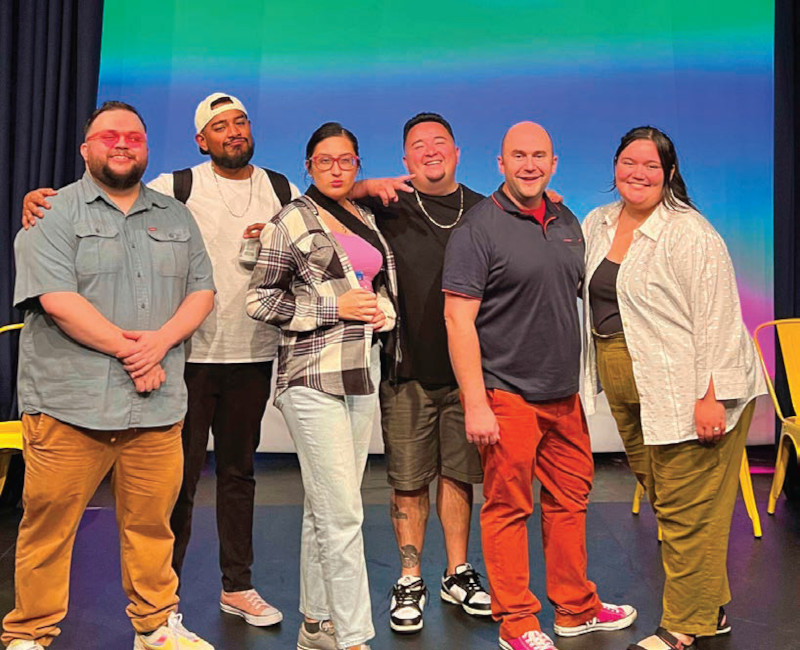
Milwaukee Courier Weekly Newspaper
"THE NEWSPAPER YOU CAN TRUST SINCE 1964"
Pedro Ruvalcaba (from left), Monchi Cavillo, Maria Acosta, Chuky Razo, Vince Figueroa and Mia Serafina pose after a show at the Interchange Theater Co-op, at 628 N. 10th St. The September show was conceived as a way of celebrating Hispanic Heritage Month. (Photo provided by Interchange Theater Co-op)
By Devin Blake
This story was originally published by Milwaukee Neighborhood News Service, where you can find other stories reporting on fifteen city neighborhoods in Milwaukee. Visit milwaukeenns.org.
Those historically left out of the world of improv comedy have a new opportunity to get involved in Milwaukee’s growing scene.
The Interchange Theater Co-op, a community-run improvisation theater and school, has established a scholarship for classes, specifically encouraging people of color, people with disabilities and LGBTQ+ people to apply.
“Milwaukee is unfortunately very segregated, and there is a large white population at our theater and other theaters in the area,” said Vince Figueroa, education director at the Interchange, located at 628 N. 10th St. “So the challenge is: How do we reach out to those other communities to get them to come perform with us and see and learn and embrace the thing that we love?”
The scholarship aims to address this challenge.
‘A really valuable art form’
Figueroa gives all the credit for the scholarship, called the New Voices Improv Comedy Scholarship, to his colleague, Mia Serafina, the Interchange’s community and culture director.
Serafina grew up in Milwaukee but performed on improv teams in less-diverse parts of the state. After returning to Milwaukee after college in 2021, she reconnected with Latinx performers and was reminded of how isolating a lack of diversity can be for an improv performer of color.
“I think accessibility to improv helps with people recognizing that it’s not just for one group of people. It’s a really valuable art form, but without points of accessibility, it’s hard to find your way there,” said Serafina.
“We just want a fuller presence at our theater,” she added.
The scholarship covers the $200 cost of a class, removing a financial barrier to entry.
“I know people who want to take classes in the scene at various theaters but unfortunately can’t, just because of the cost,” said Michael Kittelson, an LGBTQ+ comedian who performs at the Interchange.
A more diverse group of performers also reduces other barriers, Kittelson added.
“As a gay man, going into maybe a group elsewhere that might mostly be straight, that could be intimidating for me – not just talking about an improv group but just like a group that I’m not used to,” he said.
All about improv
The Interchange offers five core courses to help individuals learn different aspects of long-form improv.
Improv, short for “improvisation,” is where performers create characters and dialogue on the spot.
People may be familiar with improv from popular television shows like “Whose Line Is It Anyway,” which debuted in the U.S. in 1998 and ended its most recent run in February.
But there are different types of improv.
While “Whose Line” features short-form improv – quick, one-off scenes often based on audience suggestions – many improv classes, including those at the Interchange, provide training in long-form improv.
Long-form improv involves performers creating a series of interconnected scenes, which allow for richer characters and more sustained narratives.
“There’s just something so freeing and exciting about walking onto the stage and discovering what the scene is going to be, discovering who your character is going to be, helping your scene partner discover who they are,” said Figueroa. “So it’s its own unique art form.”
A more diverse group of performers creates stronger comedy in general, he added.
“You say ‘improv’ and some people have this standard image of four middle-aged white guys in flannel doing improv,” Figueroa said. “So when you get other people who don’t look like that … there might be some other references that you wouldn’t think of or connections you wouldn’t necessarily make.”
For more information
People interested in the scholarship can apply online.
The next deadline to apply is Dec. 20, with classes beginning on Jan. 13.
Those with questions can email education@interchangetheater.com.
Copyright © 2024 · Courier Communications | View Privacy Policy | Site built and maintained by Farrell Marketing Technology LLC
We use third-party advertising companies to serve ads when you visit our website. These companies may use information (not including your name, address, email address, or telephone number) about your visits to this and other websites in order to provide advertisements about goods and services of interest to you. If you would like more information about this practice and to know your choices about not having this information used by these companies, click here.

Recent Comments